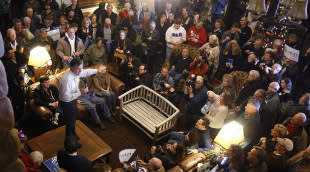How to fix the primaries: Treat them like a market, with delegates as dollars
It's no secret that states with early primaries or caucuses have had an outsized influence on the outcome of the nomination. Cutting to the front of the calendar is such a boon, particularly given the economic boost that campaigns deliver, that states are willing to sacrifice their influence at the convention in order to hold their contests early. After weighing the benefits, for example, New Hampshire, South Carolina and Florida all chose to violate Republican National Committee rules and hold their primaries earlier than allowed, thus sacrificing half their delegates at the convention.
There are many reasons why this is a broken system. Without sufficient penalties for states jumping the gun, the next cycle's primaries could easily spill into December of 2015, while states that play by the rules will remain insignificant. So here at the Signal, we're proposing a simple way to fix this process, while preserving a staggered order of contests: Treat the nomination like a market, and let states bid on how early they want to go.
The rules are simple: The RNC sets the dates of the primaries ahead of time, with a limited number of coveted early contests. To determine the order, every state says what percent of its delegates it is willing to give up in order to go first. Whichever state is willing to sacrifice the highest proportion wins the first slot. The remaining primary slots would be allocated in much the same way. The states next say what percent of delegates they're willing to forgo to be second in line to vote--presumably less than they would pay to go first, but still a substantial amount. Whoever bids the most for second position wins it, and so on. It's a classic economics problem. We have a commodity--early primaries--that's in short supply and high demand. The delegate market determines how precious those slots are.
(A useful twist is for the actual penalty incurred by the winner in each round to be the bid of the second-highest bidder--a famous procedure invented by Nobel Laureate William Vickrey that incentivizes actors to bid the actual amount they're willing to pay. Think of this like eBay, where you pay an amount just above what the second-highest bidder offered, not the absolute most you were willing to shell out.)
A number of questions remain about such a scheme, and I don't pretend to understand all of the consequences. For example, the right protocol is less clear for multi-primary days like Super Tuesday. A tiebreaking rule is necessary: what should happen if two or more states tie for the highest bid for a given primary date? The biggest unknown is just how far some states would go to be first. Would one or more states be willing to give up 100 percent of their delegates, and thus be forced to hold nothing more than "beauty contests," just for the chance to be in the early spotlight? If so, would candidates even bother to campaign there for no tangible prize? If Missouri's recent no-delegate primary is any evidence, candidates are not terribly interested in winning states where nothing is at stake. But the same might not be true if the primary had been held before Iowa.
Regardless of what you think about auctioning off primary dates, it's clear that the current system is arbitrary and unfair. A few examples:
Once Florida moved to January 31, Iowa and New Hampshire scrambled to preserve their "right" to vote first, pushing the first and very influential contests to 10 months before the general election, effectively ruling out any candidate who didn't begin planning well over a year in advance.
Florida and Arizona flouted a second rule of the party--they held winner-take-all primaries when every primary before April 1st was supposed to be proportional.
The early primary states are whiter than average and unrepresentative in other ways. The preferred candidate for voters in later states may have already dropped out. Voters and donors in later states tend to jump on the bandwagon and support the early-state winner, magnifying the impact of early states.
A national primary would be fair, but wouldn't allow voters to meet the candidates in a round of traditional "retail politics," and the primary would favor the richest candidates. Rotating the order of states at random would also be fair, but would ignore the fact that some states care more about going first than others.
The primaries are the playoffs of politics. But the system is as opaque, unfair, and antiquated as the bowl system in men's college football. It's sad that the calls for reform are much louder for the BCS than for democracy.
David Pennock is a Principal Research Scientist at Yahoo! Research. Follow him on twitter@pennockd.
Want more? Visit The Signal blog or connect with us on Facebook and follow us on Twitter.


